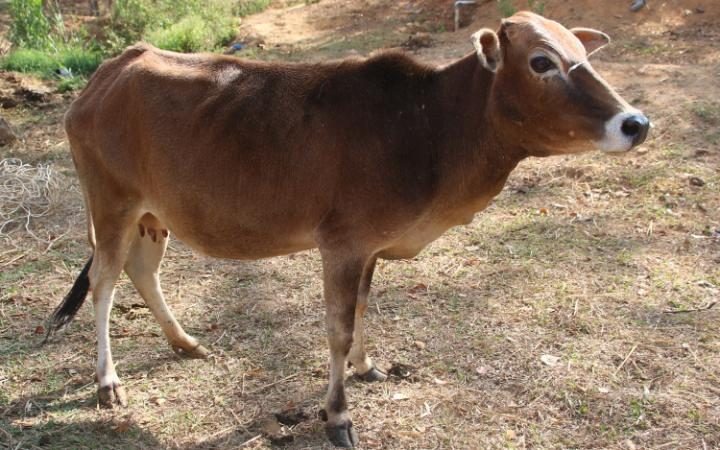
India is now the largest exporter of meat in the world and similarly ranks first for the production of leather. Yet, India has the lowest rate of meat consumption in the world due to the high percentage of lactovegetarians.
Additionally, it is the world’s largest producer of dairy products by volume, accounting for more than 13% of the world’s total milk production, while possessing the planet’s largest dairy herd. Demand for dairy is growing annually due to India’s burgeoning middle class.
This results in a clash between India’s Vedic tradition and economic opportunity. The mushrooming demand for dairy products is morphing mother cow into a cash cow.
The conditions of transporting cows to their death are horrid. Nine hundred animals have been transported in rail cars designed to hold 80, and trucks are crammed with 70 animals when legally allowed to contain four. In order to jam so many into so little space, they are tied and beaten. This has resulted in up to 50% of the animals arriving dead. Without doubt, the system is greased via graft and gratuity.
The situation is indeed grave as fluid milk, growing at 10.2% per year, fuels the growth of the nation’s milk herd. The result is that the market price of milk does not allow dairy herds to be protected in accordance with traditional values.
The outcome is abandoned cows languishing on India’s streets eating garbage while clogging their stomachs with plastic bags. Partial responsibility for this situation rests with those who consume milk. Cows need to be impregnated in order to produce milk, resulting in an increased cow population, which is being exploited by the ruthless and immoral slaughterhouse industry.
Many of the country’s gosalas —in order to stay profitable—cull bull calves and unproductive animals. Their choice is primarily limited to either the street or slaughterhouse, leaving the cows a bleak future of subsisting on garbage or to expire on the killing floor. This is the result of allowing economics to rule the day. Milk consumers must understand that their diet demands taking greater responsibility in supporting our milk-providers.
Srila Prabhupada , ISKCON’s founder-acarya, while commenting on Srimad -Bhagavatam (1.9.26), writes: “Killing of animals is a symptom of barbarian society. For a human being, agricultural produce, fruits and milk are sufficient and compatible foodstuffs. The human society should give more attention to animal protection.” And in Bhagavad-gita (17.10): “Fatty foods… have no connection with animal fat obtained by slaughter. Animal fat is available in the form of milk, which is the most wonderful of all foods. Milk, butter, cheese and similar products give animal fat in a form which rules out any need for the killing of innocent creatures. It is only through brute mentality that this killing goes on. The civilized method of obtaining needed fat is by milk. Slaughter is the way of subhumans.”
“Ahimsa Foundation for Cattle Protection” (www.affcap.org) is an organization dedicated to protecting cows and fulfilling Srila Prabhupada ’s instructions. It has gosalas ear-tag their animals with the relevant information recorded in a database. In this manner, the animals are tracked throughout their life and cannot be abandoned or sold without detection. To our knowledge, the AFFCAP certification program is unique in the world.
In order to be certified, gosalas pledge to follow the AFFCAP standard of cow protection, which defines a minimum standard of gorakña care. This ensures that protected animals are provided a uniform level of feed, exercise and shelter.
Recently, ISKCON has shown their commitment to cow protection by deputing AFFCAP to certify their cow protection facilities throughout India. ISKCON centers in Jaipur, Vrindavan, Kanpur, Mayapur, Tirupati and Ahmedabad, to name a few, have now completed or initiated the process of certification.
However, AFFCAP is not monopolized to ISKCON. Non- ISKCON gosalas in the Nagaur district, Makrana, and Jaipur area have also understood the importance of banding together to a common standard of protection and care.
In addition, programs will be implemented which include the feeding of cows; local medical camps to improve health care for both gosalas and abandoned street cows; training in vermincomposting and marketing; development of gosadhans (cow retirement homes); and funding of capital projects such as well borings, ox-powered rural electrification, fencing and sheds.
In order to broaden its appeal, AFFCAP has begun a membership program allowing those interested in cow protection to help shoulder the burden. This reduces fees resulting in greater goshala participation. The only hope is if we band together to alleviate the forces behind cow slaughter.
Srila Prabhupada instructs: “Ample food grains can be produced through agricultural enterprises, and profuse supplies of milk, yogurt and ghee can be arranged through cow protection. Abundant honey can be obtained if the forests are protected. Unfortunately, in modern civilization, men are busy killing the cows that are the source of yogurt, milk and ghee, they are cutting down all the trees that supply honey, and they are opening factories to manufacture nuts, bolts, automobiles and wine instead of engaging in agriculture. How can the people be happy? They must suffer from all the misery of materialism. . . This is not human civilization. If people actually want happiness in this life and want to prepare for the best in the next life, they must adopt a Vedic civilization. In a Vedic civilization, there is a full supply of all the necessities mentioned above (Bhagavatam 5.16.25).
The requirement now is to give practical meaning to Srila Prabhupada ’s words.
Païcaratna Dasa was born in New Zealand and joined ISKCON at Adelaide, Australia in 1981. He is the Chairman of the Iskcon India Advisory Committee, temple president of ISKCON Jaipur and Managing Trustee of AFFCAP.
